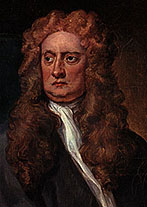 |
 |
 |
 |

(From - The Universe of Galileo and Newton, Bixby, William - 1966 ,p.125)
Isaac Newton is one of mankind's most outstanding physicists and mathematicians. Newton shaped physics and the new science. His works on physics and mathematics completed the scientific revolution of the 17th century, and served as the basis for the new science.) and thus created the theory which served as the framework of physical research for two hundred years.Newton formulated the laws of motion named after him ( Newton's law
 |
Many scientists and engineers continue to use it to this day. By means of the three laws of motion and the universal law of gravity, Newton was able to explain all known movements of the planets, and many phenomena on earth. Newton's law of gravitation states that every two objects in the universe attract each other according to their mass (the quantity of their matter - a quantity similar to weight). For example: The force which causes an apple to fall to the earth is the same force which causes the moon to "fall" toward the earth, which is why it moves about the earth in a circle rather than escaping from it in a straight line. The same force causes the earth and the rest of the planets to revolve about the sun. |
|---|
About one hundred and fifty years after the publication of Copernicus' book, De revolutionibus orbium coelestium, Newton led to the absolute triumph of the heliocentric theory over the geocentric - Ptolemaic theory by explaining the behavior of nature both in the heavens and on earth.
In addition to his mechanical theories, Newton was deeply interested in the theory of light. In 1666, Newton made a number of new discoveries in three different areas. In mechanics and astronomy he discovered the universal law of gravity. In optics he discovered that white light is composed of all the colors of the rainbow. The light in these colors is pure and cannot be broken down any further. In the area of mathematics, he laid the foundations of calculus -- the mathematical foundation on which all of modern physics is based. Calculus is one of the most important branches of modern mathematics. A little later, a somewhat different calculus was invented by Leibniz, a German philosopher and mathematician.
Newton was born in Lincolnshire in England, to a family of farmers. At the age of 19, he began his studies at Trinity College in Cambridge, where he received his degree in 1665. The Great Plague broke out in the autumn of the same year, and the university was closed. Newton left for the countryside, where he made his main discoveries. In 1667, he returned to teach at the university and continued his studies. In 1687, Newton first published his important discoveries in his Principia, which became the basic book of physics. For a short period, Newton represented the university in the English Parliament, then moved to London, where he presided over the Royal Society (the leading scientific society) until his death. He considered theology and alchemy no less important than science, and he devoted to them no less time than he devoted to mathematics and physics.
| Andrea / | Mail / | Home Page |
|---|
 |
 |
 |
|---|
![]() KNOWMAGINE - http://muse.tau.ac.il/~vrmus
KNOWMAGINE - http://muse.tau.ac.il/~vrmus